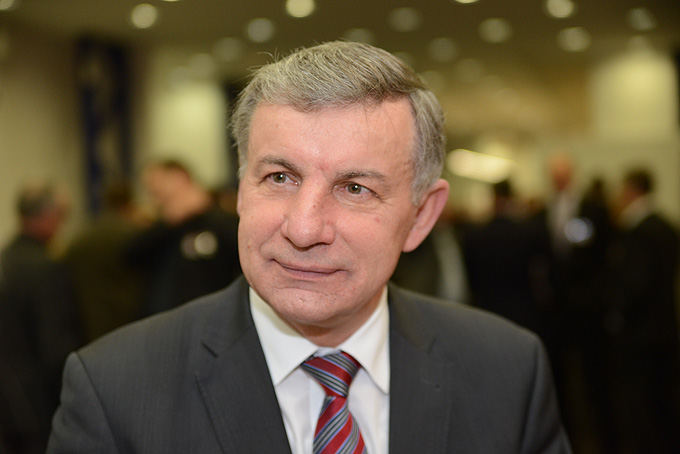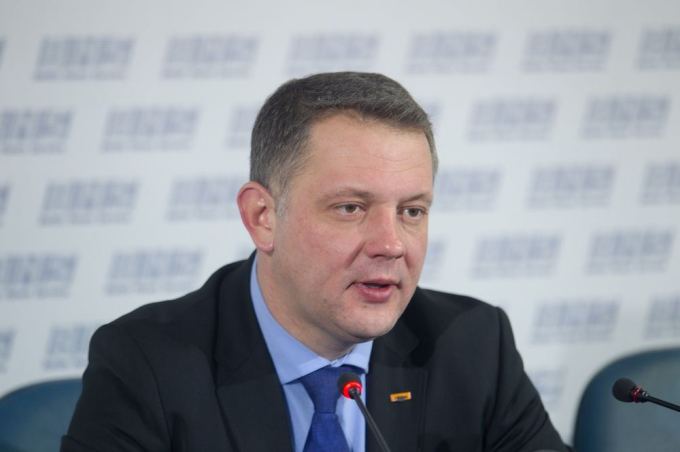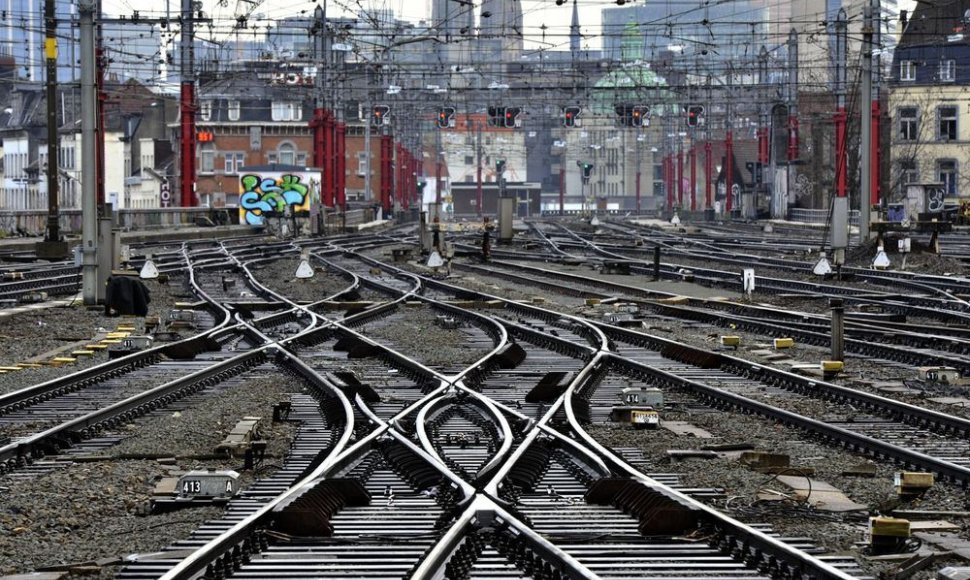The previous conservative government of Andrius Kubilius signed an agreement, pledging to establish a joint venture with regional partners in order to pursue the project, yet the new social democratic Prime Minister Algirdas Butkevičius is wavering and his government is suggesting a different form of cooperation.
Other countries involved in the project are surprised at Lithuania's sudden change of heart and are worried that the European Commission, weary of internal disagreements, might change their mind about financing Rail Baltica. The total sum of EU investment into the project stands above 3 billion euros. It is one of the biggest projected investments in the region.
Cheaper option
“Today, the biggest issue is what legal form for implementing the project to choose. There are two alternatives – a limited liability company or a European Economic Interest Grouping (EEIG),” Minister of Transport Rimantas Sinkevičius tells 15min.
 |
| A. Aušros nuotr.Minister of Transport Rimantas Sinkevičius |
According to him, the EEIG option would be cheaper. “It would cost 100 lats (142 euros) and later, each country would appoint its representatives. We would probably send employees from Lietuvos Geležinkeliai (Lithuanian Railways), which manages the infrastructure, so we would not even have to hire new staff. There have been 16 cases in the EU where countries thus implemented comparable projects. Setting up a joint company would cost much more. Maintaining its operations would set us back 4 million euros annually,” the minister explains.
We will certainly agree on the form of cooperation by September. There is no rush to set up the company.
Sinkevičius assures that even though Lithuania plans to suggest the EEIG option to other partners, there is no reason to make a final decision just yet: “We will certainly agree on the form of cooperation by September. There is no rush to set up the company. Each country has to conduct an environmental impact assessment, prepare blueprints, nationalize the land for the railway. Besides, application deadline for EU support is 2016. So there's plenty of time.”
The minister notes that, besides cost considerations, Lithuania's laws might be in the way of a joint company: “If we chose the joint venture option, there might be an issue about who would own the railway line. The Constitution of Lithuania and other laws prohibit a non-state-owned company managing infrastructural assets.”
One more obstacle, according to the minister, is the fact that the joint company would be headquartered outside Lithuania. “Upon Mr Kubilius's signature, they chose Latvia. We could still renegotiate that. The legal form of the enterprise can also have a bearing on the Lithuanian budget,” Sinkevičius says.
According to the social democratic minister, Lithuania is already ahead of schedule with its part of the project, while other countries have run into bigger difficulties.
Unreliable partner
Meanwhile former Minister of Transport Eligijus Masiulis explains to 15min that Latvia was chosen to host the joint company's headquarters because of geography: “Latvia is in the middle of the Baltics. That makes logistics easier. I've been hearing complaints that, in this way, taxes would go to Latvia's coffers, but that is a matter of agreement. In establishing the company, the parties can freely agree to share losses and profits equally.”
 |
| Eligijus Masiulis |
According to the liberal MP, Masiulis, the re-opening of discussions makes Lithuania's partners doubt its reliability as a partner. “While I was still the minister, we signed a protocol of intentions among Lithuania, Latvia, and Estonia. It envisaged a joint company to implement the Rail Baltica project. I think that by changing its position, the government casts a shadow on the solidity of our state and its image,” Masiulis reasons.
We risk earning a reputation of an unreliable partner in the region, something that will be hard to shake off.
According to him, Lithuania was at one point the leader among Rail Baltica partners, but now ill-considered statements made by the new government threaten to undermine the hard-earned position. “First, we start changing the rules for the nuclear power plant project. Now, hiccups with the Rail Baltica company. We risk earning a reputation of an unreliable partner in the region, something that will be hard to shake off,” he warns.
Masiulis also draws attention to moods of the financing institutions. “I suggest that the minister of transport and people at Lietuvos Geležinkeliai listen to what the European Commission has to say. Changing one's position so suddenly can have serious implications to the project's financing and implementation.”
According to unofficial information, the change of heart in the government might have something to do with pressure from Lietuvos Geležinkeliai management. A new international company, managed by all the partners in the project, would take away part of financial flows from existing national companies, including Lietuvos Geležinkeliai. “I think, Lietuvos Geležinkeliai had a hand in this. The transport ministry people are talking in phrases coined by Lietuvos Geležinkeliai,” Masiulis says.
Neighbours shrug
Lithuania's changing position is a point of concern for its neighbours. Both Estonia and Latvia have officially urged Vilnius to get on with establishing a joint venture. “Just like here you discuss Visaginas Nuclear Power Plant, we in Estonia discuss Rail Baltica. It is a project of particular significance to the entire region, a huge investment. It will only work, if all the countries act in concert and do their respective tasks,” Rasmus Ruuda, spokesman of Estonia's Economy and Transport Ministry, tells 15min. According to him, there were many reasons behind the decision to create a joint company – and all these reasons have been presented to Lithuania.
 |
| Rasmus Ruuda |
The EEIG form of cooperation is usually invoked in preparing joint agreements, but Rail Baltica talks are well past this stage. When it comes to actual construction work, the usual practice in the EU is to found a joint company. It would be a limited liability company, which is important when it comes to potential risk assessment. Under the EEIG, national companies would have to take on all the risk, which would bring the interest rate on loans up. The plan is to build Rail Baltica by 2023. It is highly unlikely that Finland and Poland would accept more risk and join the EEIG.
Just like here you discuss Visaginas Nuclear Power Plant, we in Estonia discuss Rail Baltica. It is a project of particular significance to the entire region.
The European Investment Bank, which will finance the project, points out that a clear legal regulation of the joint company is of paramount importance. Under the EEIG, there would be a need to reconcile legislation in five different countries. Whereas a joint company would fall under one jurisdiction of the host country.
EU legislation also bans an EEIG from seeking profits, which might present one more argument against this choice.
After the “killing off” of Visaginas Nuclear Power Plant, Lithuania's international partners fear about other international projects. In the case of Rail Baltica, the new government's stubbornness and unwillingness to compromise might jeopardize the plans of five countries. It is not so much Lithuania's particular position that disconcerts the partners as its inclination to procrastinate negotiations.













